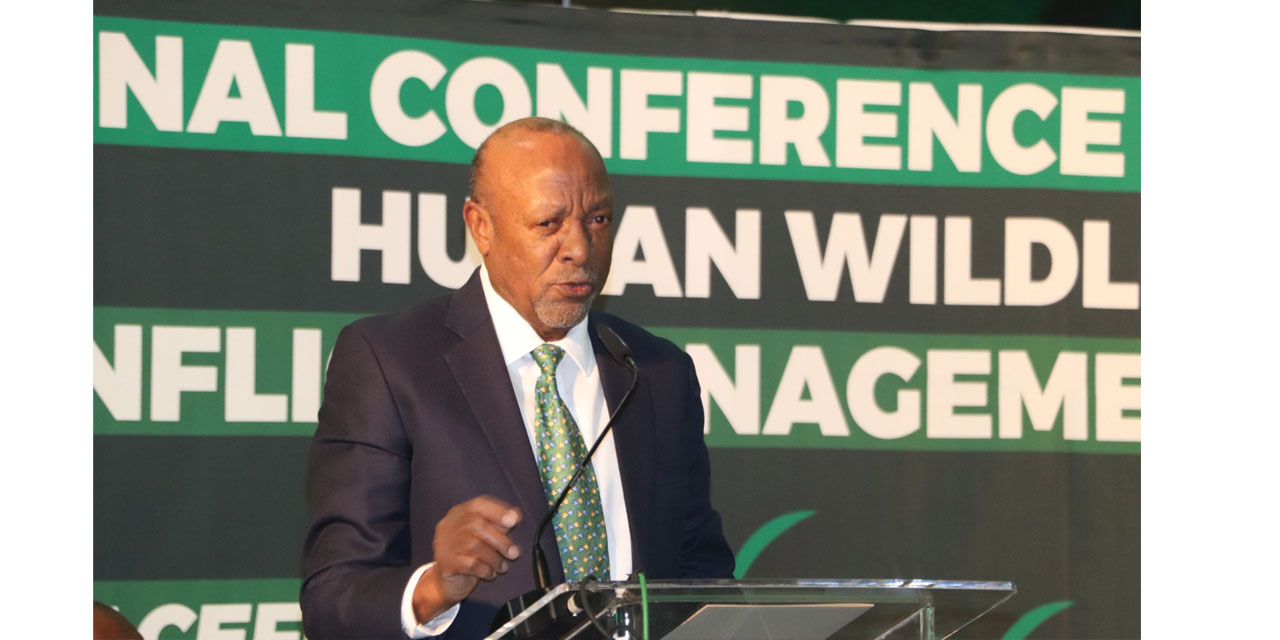Staff Writer
The Vice President of Namibia, Nangolo Mbumba says that there is a need to develop appropriate mitigation and monitoring methods and capacitate all stakeholders to effectively manage human-wildlife conflicts.
In order to achieve this, Mbumba said that there is a need to manage human-wildlife conflict in a way that recognizes the rights and development needs of local communities, recognizes the need to promote biodiversity conservation and self-reliance and ensures that decision-making is quick, efficient and based on the best available information.
The Vice President said this during the official opening of the National Conference on Human-Wildlife Conflict Management organized by the Ministry of Environment, yesterday in Windhoek.
“Human-Wildlife Conflict, as many of you know, is complex and thus requires multidimensional solutions. The impact of this conflict on people and their properties is a difficult challenge that conservation agencies and institutions such as the Ministry of Environment, Forestry and
Tourism are faced with”, says Mbumba.
He appealed to the conference to investigate and establish mechanisms that would provide compensation to affected parties whose family members die or are severely injured, as a result of human-wildlife conflict.
The Environment Ministry has been continuously receiving several requests from the public, asking for compensation for damages caused by wildlife to human lives and properties, as well as livestock and crop damages.
This indicates that there is a serious need to reduce the growing tension around human-wildlife conflicts, as losses of human lives, livestock, and crops, as well as damage to infrastructure which affects the livelihoods of our citizens, cannot continue to be tolerated, the Vice President said.
As a result, he urged all stakeholders to work closely with the Ministry of Environment, Forestry and Tourism in managing human-wildlife conflict, in line with the approved National Policy, and, as per resolutions to be agreed upon at this conference.
Mbumba al
so took the opportunity to call on international “friends who so dearly love wildlife to come on board and help us with financial, technical and managerial means”.
He further called on the National Conference to review and discuss progress, challenges and opportunities in the implementation of this policy so that specific resolutions and actions can be found to implement specific preventative, protective and mitigative strategies for human-wildlife conflict management.
Additionally, human-wildlife conflict he said, should not be the responsibility of the Government alone, but it should be the responsibility of all citizens and state agencies to minimize the losses and the impact caused by wild animals.
“We are doing this not only for our country’s benefit but also for humanity, as a whole. Biodiversity is good and beneficial for our survival as well as for the sustainable conservation of our environment”, said the Vice-President.
Meanwhile, despite all these successes, Mbumba reiterated that the government r
ecognizes that living with wildlife often carries a cost, and the increased wildlife populations in the communal and freehold farming areas result in more frequent conflicts between people and wild animals.
To this end, the government has developed a National Policy on Human Wildlife Conflict Management that provides mechanisms to manage human-wildlife conflict and benefit from wildlife and other natural resources.
Innovative approaches are being considered to reduce the level of human-wildlife conflict, to ensure that the benefits of conservation by far outweigh the costs, and to build on the significant successes already achieved.
The goal is to provide measures and approaches to manage and reduce human-wildlife conflict in Namibia from the current incidents of about five thousand per year to less than one thousand incidents by 2026.
One of its objectives is to provide clarity on the question of non-compensation with regard to damages caused by wild animals and to provide for systems and clear processes fo
r quick reaction to incidents of human-wildlife conflict.
Some of the Key problems causing animals per the policy are Elephant, Lion, Cheetahs, Leopard, Hippo, crocodiles, and Caracal. Other problem animals identified (not in the policy) are Jackal, Baboon, snakes, and others.
In addition to this, the Progress Implementation Action Plan is seeking to create sufficient economic and other benefits from the use of wildlife so that rural communities and farmers view wildlife as an asset rather than a liability.
As well as increasing hunting quotas in the short term for certain species that cause human-wildlife conflict and ensuring that human-wildlife conflict management is part of the disaster risk management and disaster risk reduction programmes.
In terms of support, MEFT’s Annual Budget is N$285 million for Salaries, overtime, vehicles, translocation equipment, helicopter, operations and development budget and early warning systems (collaring and monitoring). Translocation of problem animals (particularly lio
ns). Implementation of HWC mitigation measures through the line Ministry.
To date, since the enacted Nature Conservation Amendment Act, Act 5 of 1996, in order to provide for an economically based system of sustainable management and utilization of game in communal areas and to allow for the registration of conservancies the Government of the Republic of Namibia through the Ministry of Environment, Forestry and Tourism.
Conservancies are now benefiting an estimated 245 000 citizens in various regions of the country where conservancies are located through employment creation, receiving cash income, initiating social projects and getting in-kind benefits.




